Hadith No. 4 - Part 2 Breathing of Soul and Allah’s Decree of Rizq, Ajal, ʿAmal, and Final Destiny
At the completion of the stages of nutfah, ʿalaqah, and muḍghah, Allah sends an angel to breathe the soul into the fetus, a matter beyond our grasp.
Allah says: “And they ask you about the soul. Say, 'The soul is of the affair of my Lord. And mankind has not been given of knowledge except a little’” (Al-Isra, 17:85).
Describing the stages of embryo development and soul breathing, the Quran states:
“And certainly did We create man from an extract of clay. Then We placed him as a sperm-drop in a firm lodging. Then We made the sperm-drop into a clinging clot (ʿalaqah), and We made the clot into a lump [of flesh] (muḍghah), and We made [from] the lump, bones, and We covered the bones with flesh; then We developed him into another creation. So blessed is Allah, the best of creators” (Al-Mu’minun, 23:12-14).
The phrase “We developed him into another creation” refers to the moment when the soul is breathed into the fetus, transforming it from mere physical form into a living human being. This act signifies the transition from purely biological stages to a complete being with a soul. The verses that mention this transformation imply that the breathing of the soul is an occurrence beyond human comprehension, entering the realm of the metaphysical. This divine process, as mentioned in the Quran, is veiled from our full understanding, underscoring the mystery of life and the profound nature of human creation as ordained by Allah.
After the soul is breathed into the fetus, the angel is commanded to write four decrees: the individual’s provision (rizq), lifespan (ajal), deeds (ʿamal), and ultimate fate—whether they will be wretched or blessed. This command to the angel is meant to inform and instruct him to record what has already been decreed in Allah’s eternal knowledge. Allah’s decree, encompassing all things, has existed from eternity and was preordained long before any creation.
In a hadith, it is mentioned that the angel records this decree on a tablet placed between the child’s eyes. However, this writing is distinct from the initial recording of divine decrees. As described in another narration by Imam Muslim from ʿAbdullah ibn ʿAmr ibn al-ʿAs (may Allah be pleased with him), the Prophet (peace be upon him) said:
“Allah decreed the measures of His creation fifty thousand years before He created the heavens and the earth, and His Throne was upon the water” (Sahih Muslim).
This means that the angel’s writing of decrees for the fetus is essentially a transcription from Allah’s eternal and preserved database, the Lawḥ al-Maḥfūẓ (the Preserved Tablet), where all things have been recorded long before they came into existence. This emphasises the perfection and completeness of Allah’s knowledge and the meticulous nature of divine decree.
Provision (Rizq)
The angel records the sustenance (rizq) that Allah has decreed for the individual’s life. Ibn Manẓūr, in Lisān al-ʿArab, defines rizq as “that which sustains the life of every living being, whether material or spiritual.” This comprehensive definition broadens the concept of rizq beyond physical sustenance like food and wealth. It includes all aspects that sustain life—both tangible and intangible—such as knowledge, health, guidance, and peace of mind. Essentially, rizq encompasses everything that contributes to an individual's well-being and existence.
The concept of rizq is a cornerstone of Islamic belief, rooted in the understanding that Allah has preordained sustenance for every creation. The Quran and the Prophet Muhammad ﷺ consistently emphasised this principle, offering comfort and assurance to believers about their provisions.
As mentioned earlier, the hadith highlights that every individual’s rizq was decreed long before the creation of the heavens and the earth, reflecting Allah’s complete control over all aspects of existence. This understanding instils a sense of contentment and reliance on Allah’s wisdom, reassuring believers that their sustenance is written and assured by divine will.
In a narration reported by al-Ḥākim from Jābir ibn ʿAbdullāh (may Allah be pleased with him), the Prophet (peace be upon him) said:
“Do not be impatient for sustenance, for no soul will die until it has received all of its provision. So, fear Allah and be moderate in seeking sustenance: take what is lawful and leave what is unlawful.”
This narration teaches believers patience and reliance on Allah’s provision. The Prophet ﷺ assures that one’s rizq is guaranteed and encourages a balanced approach: pursuing lawful means of earning while avoiding prohibited methods. It also reminds believers that hastening or stressing over provision is unnecessary, as Allah ensures that each soul receives its decreed share in due time.
By trusting in Allah’s preordained rizq, believers can focus on living a life of faith, patience, and adherence to lawful means, knowing that their sustenance is part of Allah’s perfect plan.
One of Allah’s beautiful names is “Al-Razzāq” (The Provider), an emphatic form derived from “Rāziq”, indicating both abundance and continuity in the provision. This name underscores Allah’s constant and limitless sustenance for all His creations, encompassing both material and spiritual needs.
Allah emphasizes this attribute in the Quran:
“Indeed, Allah is the [continual] Provider, the firm possessor of strength” (Surah Adh-Dhariyat, 51:58).
This verse assures believers that Allah's strength and provision are infinite and that He sustains all beings, great or small. It highlights the divine balance in Allah’s provision, tailored to every creature’s unique needs.
In another verse, Allah says:
“And how many a creature carries not its own provision! Allah provides for it and for you” (Surah Al-‘Ankabut, 29:60).
This verse demonstrates Allah’s care for all creation, including those creatures incapable of procuring their sustenance. It serves as a reminder to place trust in Allah’s provision rather than being consumed by worldly anxieties.
Further, Allah declares:
“And in the heaven is your provision and whatever you are promised” (Surah Adh-Dhariyat, 51:22).
This verse reflects that sustenance is divinely determined and originates from Allah’s heavenly decree. It is a profound reminder that all provision, whether material or spiritual, comes from Allah alone.
Lastly, Allah says:
“And there is not a thing but that with Us are its stores, and We do not send it down except according to a known measure” (Surah Al-Hijr, 15:21).
This verse illustrates the meticulous nature of Allah’s provision, where every resource is stored and distributed in precise measure according to His divine wisdom. It reassures believers that Allah’s provision is never random but is carefully designed to sustain creation in the most balanced and equitable manner.
The name Al-Razzāq and these verses collectively inspire reliance on Allah’s infinite care and encourage gratitude for the blessings He bestows upon all beings.
Lifespan (Ajal)
The lifespan (ajal) of the fetus is also recorded by the angel, as highlighted in this part of the hadith. It underscores the concept of Allah’s supreme control over life and death and the notion of a preordained time for each individual.
Allah reaffirms this truth in numerous verses of the Quran. In Surah Āl ʿImrān (3:145), He says:
“And it is not [possible] for one to die except by permission of Allah at a decree determined. And whoever desires the reward of this world - We will give him thereof; and whoever desires the reward of the Hereafter - We will give him thereof. And We will reward the grateful.”
This verse emphasises that death only occurs with Allah’s permission, at a time He has fixed, and nothing can hasten or delay it.
In Surah Al-Aʿrāf (7:34), Allah further states:
“And for every nation is a [specified] term. So when their time has come, they will not remain behind an hour, nor will they precede [it].”
This reinforces the belief that every individual and nation has a predetermined end, and when that time arrives, it cannot be postponed or brought forward by even a moment.
Similarly, in Surah Al-Anʿām (6:60), Allah says:
“And it is He who takes your souls by night and knows what you have committed by day; then He revives you therein that a specified term may be fulfilled.”
Here, Allah describes that at night, during sleep, He “takes” our souls and returns them upon waking, allowing life to continue until the appointed term is fulfilled.
These verses collectively highlight the concept of divine decree (qadar), affirming that every life is set by Allah’s will alone. The fixed lifespan determined by Allah is independent of worldly factors, serving as a reminder of His absolute sovereignty over all creation.
Decreed Deeds: Righteous or Unrighteous
The third aspect recorded by the angel pertains to the deeds a person will perform—whether righteous or unrighteous. While Allah decrees a person’s path, He also grants every individual the freedom and will to choose their actions.
This balance between divine decree and human choice is reflected in Allah’s words, which means:
“Indeed, We guided him to the way, be he grateful or ungrateful” (Surah Al-Insan, 76:3), and
“Whomsoever Allah guides, he is the [rightly] guided; and whomsoever He leaves astray, you will never find for him a protecting guide” (Surah Al-Kahf, 18:17).
These verses affirm that Allah provides guidance and the freedom to choose between gratitude and disbelief, or righteousness and wrongdoing. However, one’s ultimate direction aligns with Allah’s eternal knowledge and will.
In Sahih Muslim, a dialogue is recorded between the Prophet (peace be upon him) and Suraqah ibn Malik ibn Ju’sham (may Allah be pleased with him). Suraqah asked,
“O Messenger of Allah! Explain to us our religion as though we were newly created. Is what we do today based on what the pens have already dried with and the decrees have been decided, or on what we do in the future?”
The Prophet ﷺ replied:
“No, rather it is based on what the pens have already dried with and the decrees have been decided.”
Suraqah further inquired, “Then what is the point of doing actions?” The Prophet (peace be upon him) answered:
“Act, for everyone is facilitated towards what he was created for.” (Muslim 2648, 2649).
Similarly, in a narration from Sahih al-Bukhari, the Prophet ﷺ stated:
“There is no one among you except that his place in the Fire or in Paradise has been written.”
The Companions asked, “O Messenger of Allah, should we not rely on our Book (i.e., decree) and abandon actions?”
The Prophet ﷺ replied:
“Act, for everyone is facilitated for what he was created. As for one who is among the people of happiness, he will be facilitated to do the deeds of the people of happiness. And as for one who is among the people of misery, he will be facilitated to do the deeds of the people of misery.”
Then he recited what it means:
“As for he who gives and fears Allah, and believes in the best [reward], We will ease him toward ease. But as for he who withholds and considers himself free of need, and denies the best [reward], We will ease him toward difficulty” (Surah Al-Layl, 92:5-10). (Bukhari 4666).
These narrations emphasise that while Allah’s decree is predetermined, individuals are encouraged to act righteously, as their paths in life are facilitated based on the inclinations and efforts they make. The Prophet ﷺ assures us that everyone will be guided toward what they were created for, whether it leads to a state of happiness or misery, yet the responsibility to act remains with the individual.
Decree of Final Happiness or Misery
The fourth aspect decreed by the angel concerns the ultimate fate of an individual: whether they will attain eternal happiness in Jannah (Paradise) or suffer misery in Jahannam (Hell). This destiny is tied to their righteous or corrupt deeds.
Explaining this point, the Messenger of Allah continues in the hadith we discuss:
“By Allah, besides whom there is no deity, one of you may perform the actions of the people of Paradise until there is only a cubit between him and it, but then the decree overtakes him, and he performs the actions of the people of the Fire, and thus enters it. And one of you may perform the actions of the people of the Fire until there is only a cubit between him and it, but then the decree overtakes him, and he performs the actions of the people of Paradise, and thus enters it.”
This is illustrated by a hadith recorded in Ṣaḥīḥ al-Bukhārī, where a man fought valiantly against the disbelievers. The Prophet (peace be upon him) remarked, “He is among the people of Hellfire.” The man was then injured, and in his impatience, he killed himself. When this was reported to the Prophet ﷺ , he said, “A man may perform the deeds of the people of Paradise, as it appears to the people, but he is among the people of Hell, and a man may perform the deeds of the people of Hell, as it appears to the people, but he is among the people of Paradise.”
The phrase “as it appears to the people” (fīmā yabdū lil-nās) highlights the disparity between outward actions and inner realities. A bad end may result from hidden inclinations unknown to others, while someone outwardly sinful may possess concealed goodness that leads to a blessed conclusion.
This delicate balance is further emphasised in a narration by Imam Aḥmad and Al-Tirmidhī. The Prophet (peace be upon him) frequently prayed:
“Yā Muqallib al-qulūb, thabbit qalbī ʿalā dīnik”
(“O Controller of hearts, keep my heart firm upon Your religion.”)
When asked, “O Messenger of Allah, do you fear for us when we have believed in you and what you have brought?” he replied, “Yes, for hearts are between two fingers of Allah’s fingers, and He turns them as He wills.”
In Ṣaḥīḥ Muslim, the Prophet ﷺ similarly said: “Indeed, the hearts of the children of Adam are all between two fingers of the Most Merciful, and He turns them as He wills.” Then he prayed, “O Turner of hearts, direct our hearts towards Your obedience.”
Explaining this part of the hadith, Imām Ibn Ḥajar al-Haytamī says that the concept that actions are causes of happiness or misery means that Allah created people with inclinations toward both good and evil. He knows what each person will do based on these intrinsic dispositions. Although Allah could determine happiness (saʿādah) or misery (shaqāwah) solely based on His knowledge, He is just and wise in His judgment. He ensured that every person’s deeds manifest outwardly, allowing their inherent inclinations to lead from potential to action. This is the meaning behind Allah’s words, “so that people will have no argument against Allah after the messengers” (Surah An-Nisa, 4:165), affirming that divine justice leaves no room for blame.
In conclusion, this hadith offers enlightening insights into the sophisticated interplay between the divine database, Lawḥ al-Maḥfūẓ, and the divine algorithm, Al-Qadr, which governs all aspects of existence, including provision (rizq) and lifespan (ajal). While the decrees are firmly established and recorded in the Preserved Tablet, the precise mechanism of this divine algorithm remains beyond human comprehension. Whether the measures of sustenance and time align with our finite conceptions or operate within a purely different paradigm remains beyond our grasp.
This uncertainty is highlighted in another hadith, where the Prophet ﷺ said: “Whoever wishes for his provision to be increased and his lifespan extended, let him uphold ties of kinship.” (Ṣaḥīḥ al-Bukhārī). This statement illustrates the connection between human actions and divine decrees, showing that acts like maintaining family ties can seemingly influence one’s sustenance and lifespan. However, this does not contradict the concept of preordainment; rather, it reflects the mysterious nature of Allah’s algorithm, where apparent outcomes are aligned with both divine decree and human effort.
The hadith and its connection to Al-Qadr remind us to act righteously, trust Allah’s wisdom, and remain humble in our limited understanding of His grand design. While we navigate life within our human measures, we are ultimately governed by the divine system that transcends our perception of time and quantity, perfectly balancing preordained decrees with opportunities for growth and reward through our choices.
Disclaimer
The views expressed in this article are the author’s own and do not necessarily mirror Islamonweb’s editorial stance.

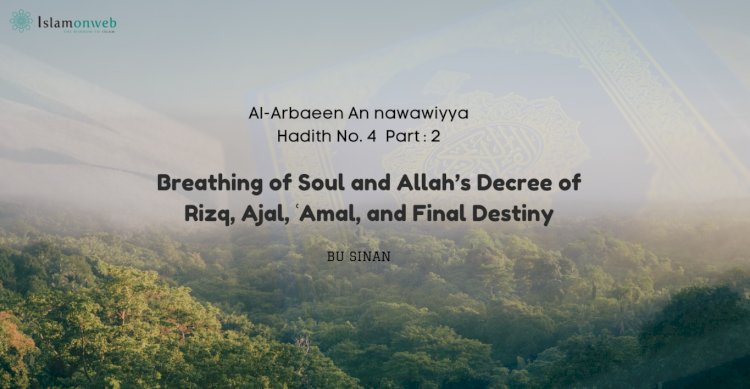


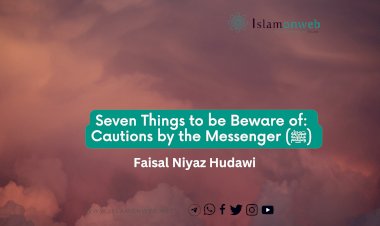
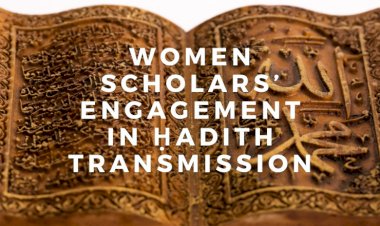
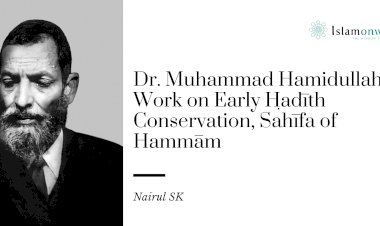
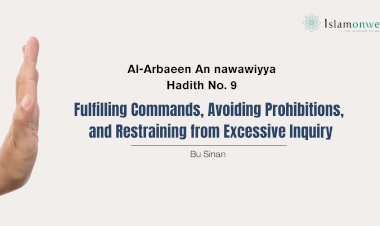
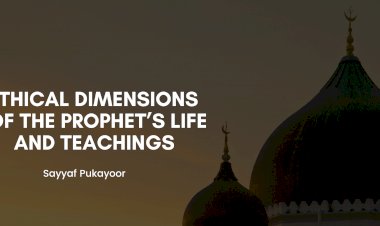
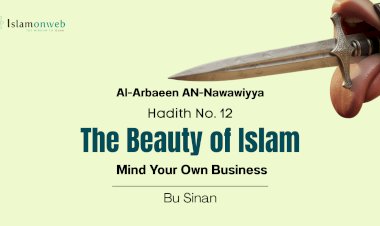














Leave A Comment